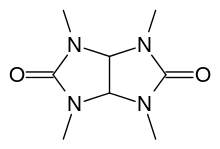Mebicar
Mebicar (mebicarum) is an anxiolytic medication produced by Latvian pharmaceutical company Olainfarm and sold in Latvia and Russia under the brand name Adaptol.[2] Mebicar is not approved for use in the United States.
 | |
| Legal status | |
|---|---|
| Legal status |
|
| Pharmacokinetic data | |
| Elimination half-life | 3h[1] |
| Identifiers | |
IUPAC name
| |
| CAS Number | |
| PubChem CID | |
| ChemSpider | |
| UNII | |
| CompTox Dashboard (EPA) | |
| Chemical and physical data | |
| Formula | C8H14N4O2 |
| Molar mass | 198.226 g·mol−1 |
| 3D model (JSmol) | |
SMILES
| |
InChI
| |
Mebicar has an effect on the structure of limbic-reticular activity, particularly on hypothalamus emotional zone, as well as on all 4 basic neuromediator systems – γ aminobutyric acid (GABA), choline, serotonin and adrenergic activity. Mebicar decreases the brain noradrenaline level, exerts no effect on the dopaminergic systems, increases the brain serotonin level, and does not elicit cholinolytic action.[3]
Mebicar purportedly has anti-anxiety (anxiolytic) properties.[3][4][5][6][7] It is also used to aid smoking cessation.[2] In addition, mebicar may be useful in the treatment of ADHD symptoms.[8] In contrast with typical anxiolytic medications such as benzodiazepines, mebicar is non-habit forming, non-sedating and does not impair motor function.[4][2]
See also
References
- Schwarz, Joseph; Weisspapir, Michael. "Sustained release pharmaceutical composition containing mebicar". Retrieved 20 June 2017.
- Adaptol product summary "Archived copy". Archived from the original on 2013-10-13. Retrieved 2013-05-29.CS1 maint: archived copy as title (link)
- Val'Dman, AV; Zaikonnikova, IV; Kozlovskaia, MM; Zimakova, IE (1980). "Characteristics of the psychotropic spectrum of action of mebicar". Biulleten' eksperimental'noi biologii i meditsiny. 89 (5): 568–70. PMID 6104993.
- Val'Dman, A. V.; Zaikonnikova, I. V.; Kozlovskaya, M. M.; Zimakova, I. E. (1980). "A study of the spectrum of psychotropic action of mebicar". Bulletin of Experimental Biology and Medicine. 89 (5): 621. doi:10.1007/BF00835799.
- Mkrtchian, VR; Kozhokova, LZ (2012). "Adaptol--verges of possible". Likars'ka sprava / Ministerstvo okhorony zdorov'ia Ukrainy (5): 125–33. PMID 23534281.
- Chutko, LS; Rozhkova, AV; Sidorenko, VA; Surushkina, SIu; Tursunova, KB (2012). "Generalized anxiety disorder: Psychosomatic aspects and treatment approaches". Zhurnal Nevrologii i Psikhiatrii Imeni S.S. Korsakova. 112 (1): 40–4. PMID 22678674.
- Chutko, LS; Surushkina, SIu; Nikishena, IS; Iakovenko, EA; Anisimova, TI; Kuzovenkova, MP (2010). "Asthenic disorders in children". Zhurnal Nevrologii i Psikhiatrii Imeni S.S. Korsakova. 110 (11 Pt 1): 26–9. PMID 21183919.
- Chutko, LS; Surushkina, SIu; Nikishena, IS; Iakovenko, EA; Anisimova, TI; Sergeev, AV (2009). "Adaptol in the treatment of ADHD". Zhurnal Nevrologii i Psikhiatrii Imeni S.S. Korsakova. 109 (8): 45–8. PMID 19738569.